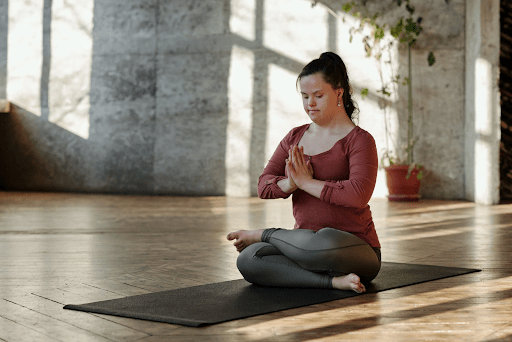5 Benefits Of Daily Meditation
Share this content :

Look back to the most stressful days of your life. Think about that time and how it felt to have all those burdens over your head. Did you feel like your brain was about to break apart? Was there a moment when you wanted to lie on the ground and shut off? If you have, then that means you were overwhelmed by a lot of stress and anxiety.
Being a business owner, I know how that can be. There are times when things don’t seem to work out. Projects fail, people make mistakes, and plans change on the fly. All of these things can be overwhelming. Thankfully, I have one simple trick that has helped me manage all that frustration: meditation.
Now, you might think that meditation is overrated. Perhaps the idea of sitting down and closing your eyes for a few minutes sounds silly or foolish. However, as someone who practices it every day, I assure you it’s a great help. Through meditation, you can learn how to hone all your anger and channel it to something better. Here are the facts and the benefits of meditation that you ought to know!

What exactly is meditation?
Most people assume that meditation is a series of breathing exercises or a mental trance that takes you into your favorite place. While both can happen, that’s not exactly what meditation is. Let’s understand what it means to meditate and how it changes your mind for the better.
Meditation is a method or a process that helps you enter a state of focus and awareness. Depending on the style you use, meditation can be done in motion or while immobile. It can be completely silent or a series of mantras and phrases. The bottom line is that meditation teaches your mind to stop wandering or getting lost. Instead, it tries to focus all your energy and concentration on something more meaningful. Sometimes, this can be done to relax your mind and let your emotions simmer down. Other times, it can be used to help you focus your attention on an important task or plan.
While meditation has been around since 1500 B.C., it’s become a worldwide phenomenon. Around 500 million people practice meditation around the globe, and 14% of adults in the US have practiced meditation. As you can see, the numbers show that the art of meditation has withstood the test of time. Even now, thousands of people take the time to relax, reflect, and reorganize their thoughts.
What types of meditation are there?
Before you can learn what the benefits of meditation are, you should know what type you want to try. Contrary to popular belief, there are several ways to meditate. Here are five different kinds that you can explore, whether you’re a first-time practitioner or you’re restarting an old habit.
3. You don’t plan ahead of time
Another reason you are always procrastinating is that you think you still have a lot of time. Procrastination is related to unhealthy personal financial behaviors, such as postponing retirement savings, last-minute shopping, and not paying bills on time. In an article published in Frontiers of Psychology, Thor Gamst-Klaussen and his team presented a paper exploring factors that could explain why procrastinators demonstrate more financial problems than non-procrastinators.
Mindfulness Meditation
Let’s start with one of the most well-known types, mindfulness meditation. As the name implies, it tries to get you to be more mindful of where you are and what you’re doing. Typically done with breathing exercises, mindfulness meditation puts your focus on every sensation in your body. You notice your breath fall up and down, your body as it rests on a bed or a mat, your ears as they pick up random sounds in the environment, and so on.
What makes this practice so special is that it doesn’t force you to react or focus your thoughts in any way. Rather, it trains your mind to just observe and carry on. You’re not pressured to memorize or focus your wandering thoughts. This makes it much easier for beginners to start with, or those who want to meditate without a specific guide or teacher.
Considered one of the most popular forms of meditation today, mindfulness meditation has also been studied and researched. Many scientists and medical experts have touted the practice’s ability to reduce stress. They’ve also found that it has helped reduce the symptoms of stress-related conditions, such as fibromyalgia and post-traumatic stress disorder.
Focused Meditation
One of the benefits of meditation is that it hones your ability to concentrate. Of course, that can vary between the types that you practice. For focused meditation, this becomes the absolute priority.

Focused meditation also uses your body’s senses and sensations to channel your thoughts. However, this one has you focus all your attention on a singular item or movement. Whereas the previous one was about observing, this one is all about tunnel vision.
For example, focused meditations can have you look at a specific object in the room or think only about your breathing. Everything else is just background compared to that thing. Keep in mind that this practice can be tough for new practitioners since it requires a lot of mental effort and concentration to work.
Movement Meditation
Typically, when you think of meditation, you’d likely imagine someone sitting down and closing their eyes. You might have the image of a person sitting cross-legged and humming to themselves. In short, your idea of meditation could be staying still and keeping quiet.
However, not all forms of meditation will ask you to be immobileTherere are many exercises and workouts that use breathing exercises and mindfulness to work. This type, known as movement meditation, takes the best of both worlds to happen. Examples include tai chi, dancing, and even a simple walk around the park.
What makes it so special is how movement and mindfulness are connected. Being active while you’re meditating can help you be more aware of your body and surroundings. It’s easier to know how your feet or lungs are working when you put them to use. Plus, it can also be a fun way to exercise, which is another way to relieve stress. So, you get the benefits of both exercise and meditation with one relaxing routine!
Mantra Meditation
Historically speaking, meditation was first observed in India. It initially started as a Hindu practice, though it has since expanded to cater to all types of people. That said, many of the Hindu and Buddhist practices have carried on in each form. One of them is the use of a mantra, which is a saying or phrase that you repeat.
Through mantra meditation, you get to channel your awareness through a single word that adds meaning to your life. It can be a specific word, a phrase, a statement, or even the well-known “Om”. Whatever mantra you choose, it helps set your mind in the right direction.
The reason why people enjoy mantra meditation is that it seems easier to do than being silent. Some find it hard to keep still or stay quiet, so a mantra helps them add sound without breaking the practice. In addition, the words used can also help focus your mind on the right intention. For example, you could spend ten minutes reciting the phrase “Today will be my day”, which can lift your spirits and give you more confidence.
Visualization Meditation
One of the most fun types of meditation is the one that uses visualization. Here, practitioners try to imagine a scene in their minds. They use their creativity to get as much detail as possible. The visual could be a memory, an image, or a person that they admire. It could also be a specific scenario, such as winning a prize or hugging an old friend.
The interesting thing about visualization is that it can reduce your stress levels and give you more confidence. By imagining and reacting to a scenario, your mind and body can feel a sense of calm and joy. Sometimes, even the most dreamlike place can be enough to set your thoughts at ease. Plus, if done through a guided video or narration, it can take you on a journey.
While there are other types of meditation available, these five are among the most popular and well-known by practitioners today. However, if you want to explore more, check out this article by Healthline. Through it, you can see which options fit your mindset and lifestyle.
Why should I meditate every day?
Now that you know these various types, it’s time to learn the different benefits of meditation. The reason why it’s still as popular today is because of how meditation has helped people. Some have been able to relax and reduce the stress in their lives, while others have been able to concentrate and focus better. Here are five benefits of meditation that you can get when you make it a daily habit!
1. It can slow down aging.

Do you believe that you can age slower than normal? While it might sound silly, there are ways to do so. As we age, our brains shrink over time. This results in less functionality and poor memory. However, a study by UCLA revealed that long-term meditators had bigger brains and better memory than those non-meditators.
To think that 10 minutes of meditation a day could make that kind of change!
2. It changes your brain structure.
Aside from making the brain bigger and functionally better, meditation could change its structure. Research has shown that after only eight weeks of meditation, the brain’s hippocampus grew bigger. The hippocampus is the part of the brain that deals with learning and memory. It’s what can turn your short-term memories into long-term memories. So, by meditating, you can remember things better and process information faster.
3. It reduces your wandering thoughts.
Are there moments in your life when you remember the past? Do you recall sad, awkward, or unhappy memories in your life? Do you also end up wondering and worrying about the future? If so, then you might be suffering from wandering thoughts.
The problem with these kinds of thoughts is that they can take you out of the present moment. Even if nothing is happening, those questions could make you feel nervous or stressed. Meditation can help you control these wandering thoughts and keep you mindful of the now. Studies have shown that those who meditate find it easier to reset their wandering thoughts to the present moment. This can lead to a happier life, a more relaxing mindset, and a better mental state.
4. It increases your pain tolerance.
Have you ever seen those videos about martial artists who can withstand hits by spikes or planks? While this is an extreme practice, there is something to be said about meditation and pain tolerance.
A study by the Journal of Neuroscience in 2011 found that meditation affects the pain mechanisms in your brain. After all, pain is a mental process that warns your body and mind of danger. So, with meditation, you can learn to tolerate and withstand both physical and mental pain. For example, you can use meditation after a workout to feel more refreshed and relaxed. You can also use it to keep stress controlled, protecting your mind from unwanted thoughts and fears.
5. It helps you reach your flow state.
Have you ever experienced a moment when you entered a flow state? It could happen when you put all your focus into a single task or objective, like a basketball player in a playoff game. Words, actions, and movements all seem to flow from you. It feels so natural that you manage to do amazing things without thinking about it.
Meditation could be the key to getting you there. Going into a flow state isn’t as easy as flicking a light switch. It can take some time for you to get fully engrossed in that state of mind. However, meditation is all about focus. Practicing it often can help you transition quickly from your normal state to your flow state. It’s like learning how to sit down and stand up; the more you practice, the easier the motion becomes.
How do I start meditating?
Once you know the benefits of daily meditation, you might be looking to start right away. However, it can be daunting for a first-time practitioner to start meditating daily. To help you out, here are five useful tips you can use to get started.
Start slow, then work your way up.
If there’s one thing I learned from years of meditation and habit formation, it’s that you can’t rush it. You can’t expect to handle ten minutes of meditation every single day from scratch. It might be possible, but it’s hard to do.

Instead of rushing to perfection, do yourself a favor and take it slow. See how long you can meditate in your first sessions. For example, if you can manage five minutes of meditation without issue, then start with that limit. Don’t force yourself to do it every day from the jump. You can start with alternating days to get you into the mood. That way, you can build up to making it a part of your normal routine.
Listen to your breath and body.
All forms of meditation emphasize the importance of listening to your body. Whether it’s the breath you take or the moves you make, learn to watch yourself. Stay mindful of how your body feels and what it needs you to do. Sometimes, you might need to concentrate first to see if you’re comfortable.
Also, don’t be upset when your thoughts wander on occasion. One of the benefits of daily meditation is learning to reorient your mind from random thoughts to a focused state. That kind of change requires practice, so don’t be mad if you start thinking of other things. Instead, take a deep breath and bring yourself back to your focus, such as your breath or an object in the room.
Temper your expectations.
Most people who try to meditate might feel confused or unhappy at first. Those introductory sessions could feel so disappointing or underwhelming. Perhaps you want those benefits of daily meditation to start right away. However, remember that meditation takes time to master. Like any skill, you won’t learn to be an expert without giving enough practice and effort. So, before you begin, always remember that you are at the starting lining. Don’t rush yourself to mastering 10 minutes without delay. Take it slow and you’ll eventually get there.
Be kind but focused on your wandering mind.
Meditation is a good way to relax and focus your thoughts. However, like anything in life, there will always be distractions. Sometimes, your pet might come by and break your focus. Other times, a neighbor or a passing pedestrian could make a lot of noise.
When those moments happen, your brain loses focus for a moment. If that’s the case, do yourself a favor and reorient your mind. Sometimes, distractions can be a funny thing that takes you out of the moment. However, meditation isn’t meant to be a perfect state of zen. Rather, it’s about getting your mind to relax and reorganize.
So if you get wandering thoughts or odd distractions, take a moment then fall back into place. And if you have to cut your practice short, don’t worry. You can find more time to meditate during the day.
Make it a habit.
Start by setting a time in your day to meditate. It could be early in the morning or late at night. Remember, you don’t need to set aside a full hour to make due. Five to ten minutes can be enough to get your mind in the zone. The more you practice, the easier it will be to follow through. Plus, if you keep doing it at a specific time, your body will learn to adjust. Make meditation a habit and build it up over time. Soon, you’ll find yourself enjoying the benefits of daily meditation before you even realize it!
Takeaways:
- Meditation is a process that helps you enter a state of focus and awareness, which can be done in motion or while immobile.
- There are different types of meditation, including:
- Mindfulness meditation
- Focused meditation
- Movement meditation
- Mantra meditation, and
- Visualization meditation.
- Practicing different types of meditation can help you find what fits your mindset and lifestyle.
- Meditation teaches your mind to stop wandering and focus on something more meaningful, whether it is to relax your mind or help you focus on an important task.
- There are various benefits of daily meditation, such as:
- Slowing down aging
- Changing brain structure
- Reducing wandering thoughts
- Increasing pain tolerance, and
- Helping you reach a flow state.
- To start meditating, begin slowly and work your way up to a full-length session.
- Listen to your breath and body as you meditate.
- Learn to temper your expectations about meditation and its effects.
- Be kind but focused on your wandering mind.
- Lastly, make meditation a habit by setting a specific time each day.
- Building a meditation habit takes time, patience, and effort, so don’t rush the process and enjoy the journey of reorganizing your thoughts.
Are you tired of being weighed down by financial stress? It’s time to take control of your finances and live the life you’ve always dreamed of. And the best part? I’ve got you covered with a FREE book here, packed with practical tips and techniques to help you grow your wealth. Don’t wait any longer to start living the life you deserve, grab your copy now before it disappears!
Share this content :
Copyright © 2023 Munif Ali. All rights reserved.

